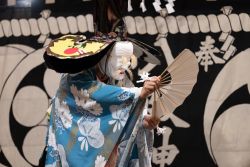
August 20, 2012
Is Microfinance the Answer for Tohoku?
Nobel Prize-winning economist Muhammad Yunus discusses the possibilities
By Metropolis
Originally published on metropolis.co.jp on August 2012

A lot of ink has been spilt on the ways that government, NGOs, and society could and should be helping to rebuild lives in Tohoku. But is it possible we’ve neglected to look at a potentially more lasting strategy: entrepreneurialism? Dr. Muhammad Yunus, winner of the Nobel Prize for Economics, former managing director of Grameen Bank, and pioneer in the microfinance movement, was in Tokyo last month to talk about the potential of microloans and social entrepreneurship to get Tohoku back on its feet and keep it there.
“When you come to a disaster area like Tohoku, [financial services are] all the more important,” says Yunus. “You can’t go on living with someone else’s help forever. It’s a temporary thing that people help you, but people should help you to get back to your life. That needs financing.”
Microfinancing, which entails giving entrepreneurs small low- or no-interest business loans, is especially suited for Tohoku because many of the disaster victims have lost anything that might have been used as traditional collateral and many business owners already have outstanding loans that they can’t pay off.
“First thing we do is say, ‘forget about your loans. Tell us what you need now so we can come and give it to you’,” says Yunus, talking about the way Grameen Bank handles disaster victims in Bangladesh. The most urgent mission is to get the engine of the economy running again, he says. Existing loans must be restructured into no-interest, long-term loans so lenders can recoup losses without crushing the borrower with ever-increasing debt.
But finding the financing to get businesses running is only half of the solution, as the Nobel Prize-winner sees it. The other half is making sure funding goes to what he calls “social businesses.” These are cause-driven enterprises whose objective is not personal gain but the pursuit of social goals. Any profit a company makes is reinvested. In Tohoku, the goal could be something as simple as creating employment or something that would keep people and money in the area, and create a market for social goods like public transportation and medical facilities.
With the assistance of the Yunus and Shiiki Social Business Research Centre (SBRC) at Kyushu University, some social businesses are already sprouting up in the area. Executive Director Masaharu Okada gave one example where older women living in temporary housing teamed up with an American designer to craft a series of handmade dolls. The key, says Okada, is quality. The SBRC is assisting them by providing distribution channels, because “this product is good, not because this product is manufactured by victims.”
Another positive development is that Miki Watanabe, CEO and chairman of significant restaurant chain Watami, announced on July 24 the creation of a $20 million Social Business Fund for Japan to finance innovative social businesses in Japan. The Fund is kicking things off with a design competition for young people. The selected winners will receive seed money in order to build their own social businesses and put their ideas into practice.
A business that isn’t focused on making a profit for its owner might seem counterintuitive, but it allows businesspeople to both make a living and have the satisfaction of making a positive impact on the world at the same time—something that appeals to both the better and worse sides of human nature.
“Selfishness is an integral part of human beings, but it is not the only part,” says Yunus. “They are also selfless, every human being.”
For more information, see www.muhammadyunus.org or http://sbrc.kyushu-u.ac.jp/english.







